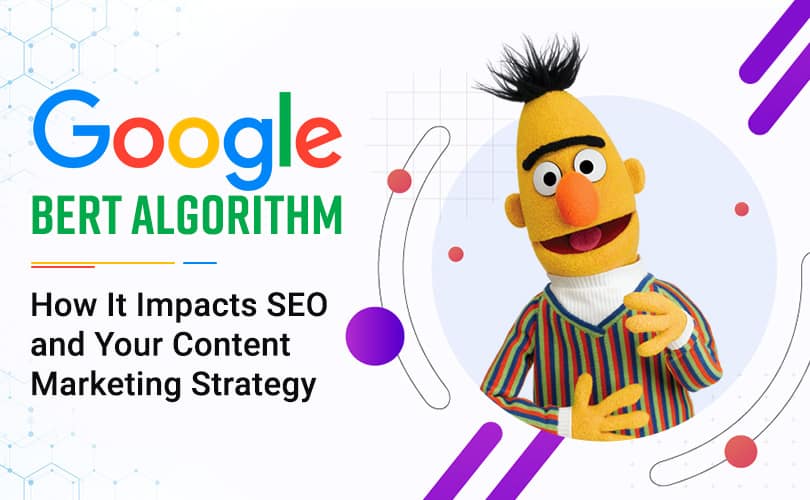Google’s BERT Algorithm: How It Impacts SEO and Your Content Marketing Strategy

Have you heard of BERT? No, we’re not referring to Ernie’s best friend from Sesame Street (even though Bert and Ernie are both admittedly fantastic). What we’re really talking about is Google’s search engine BERT update. BERT was first launched back in late 2019, but it continues to have a profound impact on search engine results to this day.
But let’s take a step back to learn more about Search Engine Optimization (or SEO). Successful SEO efforts pay close attention to emerging search engine algorithms. For SEO practices to be effective, it’s imperative to understand how search engine algorithms work.
There are several search engines operating on the web today, including Bing and Yahoo. But no matter how you slice it, Google is still the king of the search engine space.
And to that end, Google continuously makes algorithm updates to make its search process both more user-friendly and efficient. And one of the most important Google updates up to this point is BERT.
It was originally posited that BERT would immediately impact some 10% of all search queries on Google, but the truth of the matter is that BERT has probably impacted much more than that. How? What’s the deal with BERT? Keep reading to learn more!
So, what is BERT exactly?
BERT is an acronym which stands for Bidirectional Encoder Representations from Transformers. That’s a mouthful for sure, but it simply refers to Google’s efforts to help its search engine better understand natural language processing. BERT was originally focused on English-language queries, including featured snippets. But BERT has since been rolled out for many other major languages in which Google offers search functionality.
Understanding any human language can be a difficult task for a computer. Along with the knowledge of the language itself, nuances of culture and emotion have to be factored in, as well. And that’s really the point of BERT. Now, no matter what language you’re using on your website, BERT can help computers to understand the context of your words and then match them to relevant query results. This ultimately has an impact on the ranking of your website, and on what traffic it’s able to generate for you.
BERT is essentially a neural language processing framework which helps to decipher the intent around the particular topic being searched. BERT assists Google by allowing the word context from surrounding phrases to be factored in, rather than simply focusing on the immediate words that come before or after. And if your content is easy for BERT to process and prioritize, then your website will rank higher, more traffic will be directed your way, and your bounce rate will likely be reduced as well.
How does BERT impact SEO and content?
To align your website goals with how BERT processes information, you don’t necessarily need to make any drastic changes to your website structure. If your content has been working for you, then continue to write content in the same way as you have been. The point of BERT is to help Google understand the text presented on your website better; BERT isn’t designed to analyze the quality of your content, per se.
Even so, SEO experts do recommend a few minor changes where your content is concerned, in order to continue seeking the top position for your website rankings:
• Stop using irrelevant keywords
BERT focuses on search queries and analyzes them deeper and more comprehensively than before. If your website has displayed some confusing or dual-aspect keywords in the past, you’ll want to stop using those types of keywords going forward. Better to focus on using only relevant keywords that have a direct contextual connection with your content and any related search queries.
• Use more long-tail keywords
BERT is also intended to help optimize for voice searches, since voice search has become much more prominent in recent years. More and more people are now conducting audible searches from their smartphones, smart devices, and smart speakers, so BERT was designed to help meet and respond to this consumer demand. Because naturally-spoken language often involves the use of some longer-tail keywords, you’ll want to design and publish your content to match that of the spoken word.
• Original content is impactful
Many webmasters will simply try and translate their content into that of regional languages to help their websites rank, but creating original, authentic content is really much more impactful. Users will better resonate with originally-written content, and this type of content does a better job of helping them to find answers to the questions they’re asking of a search engine like Google.
• Relevance of content matters
Just stuffing in a bunch of keywords and hoping to get your content ranked really isn’t an effective strategy anymore. Thanks to advances like BERT, Google only decides to rank content that relevantly addresses those exact questions posed by searchers. If you’ll pay close attention to this fact in generating content for your own page, you’ll be able to boost the amount of organic traffic your site receives.
How does BERT impact content marketing strategy?
Simply put, BERT is meant to understand the queries of human users in more of a “human” manner, as opposed to traditional machine learning. You could say that Google’s BERT algorithm wants to understand humans better, in order to more effectively address any queries received. Here are a couple more tips to help you understand BERT better.
• Information queries become more important
When studying the BERT trend, As a rule, informational queries are comparatively more ambiguous than mere transactional or navigational queries, due to the nature of human language. BERT serves to help dispel this ambiguity, and does a better job of helping to deliver specific answers to specific user search questions. BERT even has the ability to decipher any missing words to help complete the search query in a manner that fills the gaps for meaningful context. The results obtained through BERT-powered searches are meant to be more exact and more useful than ever before.
• Length of content
In an earlier update of Google, it was noted that longer content tends to rank higher and faster – but that isn’t always the case. Nowadays, it’s really about more than just length; the quality and relevancy of your content are even more essential. Even a short content piece of 500 words or less may rank higher than some other long-form content, provided that the user query is answered both concisely and accurately.
How should we optimize for BERT?
In the final analysis, Google always focuses on quality content that adds value to the user. Hence, the primary focus of SEO must be about resolving users’ queries to the full extent possible. As far as BERT is concerned, you should continue creating content that’s compelling, engaging, informative, concise, and well-structured.
Got other questions about BERT? Looking for some more help when it comes to optimizing your website and its content for maximum target audience impact? Thankfully, the pros at Cibirix Digital Marketing are here to help! Connect with one of our digital marketing experts today, and let’s get the conversation started
About Author

Pranav Sharma
As an SEO Analyst for Cibirix, Pranav Sharma is passionate about performing technical, on-site, off-site optimization and creating effective backlinks for both B2C and B2B business clients. He leverages only the best “white hat” SEO techniques to deliver improved business results for clients, and one of his primary goals is to help businesses make better investments in their websites that will generate better long-term results. In his free time, he enjoys playing cricket, singing, and spending quality time with friends and family.




